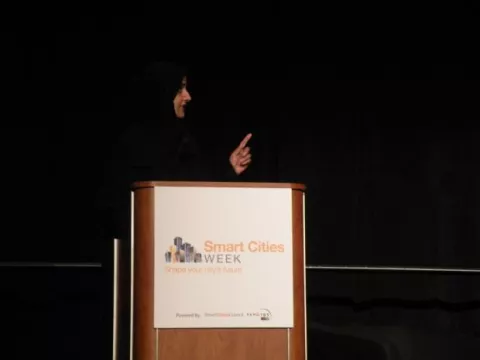
City leaders looking for inspiration in their smart city endeavors need look no further than Dubai, where a digital transformation has been under way for two decades now. What’s particularly inspiring is how citizens are front and center in the city’s mission to become the happiest city on earth.
In the 1960s, Dubai was little more than a small trading post by a creek, according to Dr. Aisha Bin Bishr, Director General of Smart Dubai. Today, of course, Dubai is a sparkling gem – and the most populous city -- in the United Arab Emirates. It’s also a world leader in digital advancements – all part of a mission to improve the lifestyles of people who live in and visit Dubai.
Dr. Bin Bishr was one of several international smart cities experts who spoke as part of a Smart Cities Week panel moderated by Leocadia Zak, Director of the U.S. Trade and Development Agency. As Zak put it, “Smart cities is not just a buzzword to my agency… it’s a mission.” Others on the international panel included Pratap Padode, Executive Director of Smart Cities Council India; Adam Beck, Executive Director of Smart Cities Council Australia New Zealand; Graham Colclough, Executive Director of Smart Cities Council Europe, and Michinaga Kohno, Senior Research Fellow at the College of Science and Technology, Nihon University in Japan.
Focused on happiness
One of the themes that surfaced during the session was the need to humanize the smart cities movement and pay more attention to what citizens actually want and need. In Dubai, a focal point of the city’s efforts has been focused on embracing technology and innovation to promote citizen happiness.
One example: A simple sentiment analysis tool dubbed the “Happiness Meter” features touchpoints around the city where services are delivered. The idea is to gauge citizen satisfaction with the services they’ve received. Agencies that do well are celebrated; others have the data they need to improve.
Smart cities advocates really do need to bring the conversation to the human level, to talk about making people’s lives better, suggested Beck from Australia. “We need to humanize this movement a lot more.”
Engaging citizens
Cities haven’t figured out how to engage people in a real sense, suggested Colclough of the European Smart Cities Council. Oftentimes engagement is about satisfying a politician’s desire, not a systemic thing. “There’s a long, long way to go on this particular topic,” he advised.
Still, events often change minds and behaviors. Kohno said that in Japan people were less serious about climate change – but that’s changing due to frequent torrential showers and a realization that smarter, more resilient infrastructure can help reduce the impact of extreme weather as well as earthquakes.
Having leaders willing to champion smart cities is also essential, although different approaches work in different countries. Padoda said that in India, where resources are few, they often rely on inspirational leadership. However, an environment where innovation and inspiration are encouraged is also essential to smart cities development, he said.
Read more on...
Smart Cities India
Smart Cities Australia New Zealand
Smart Dubai



